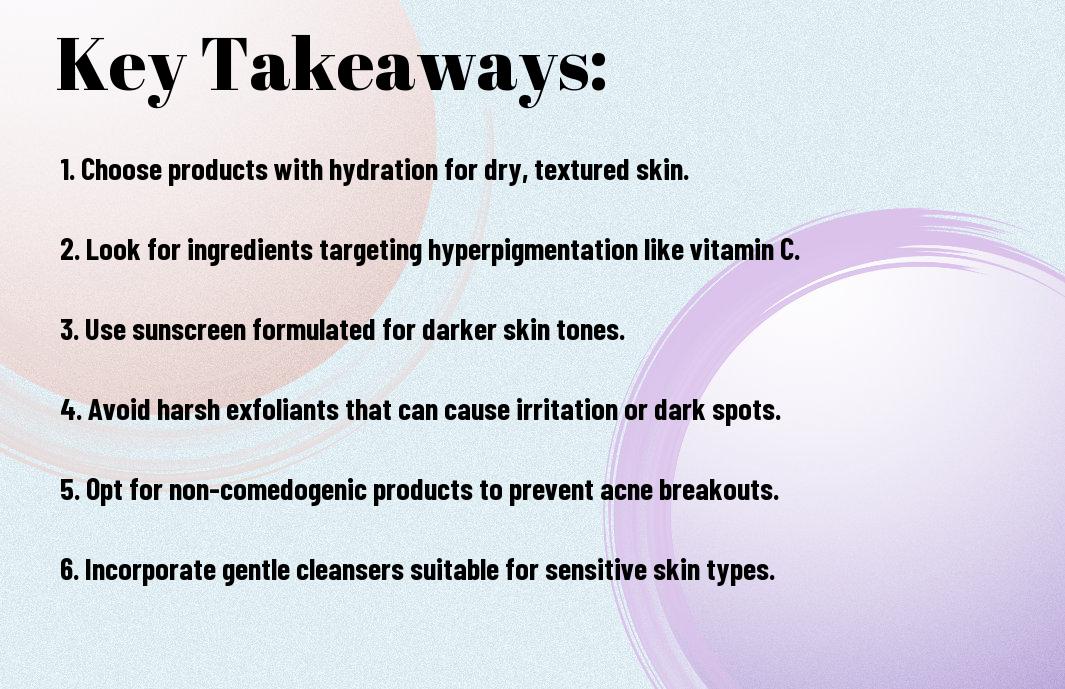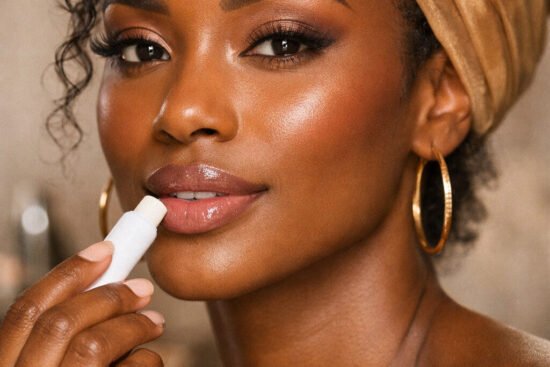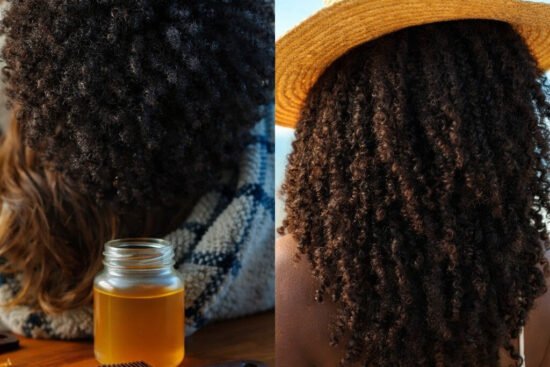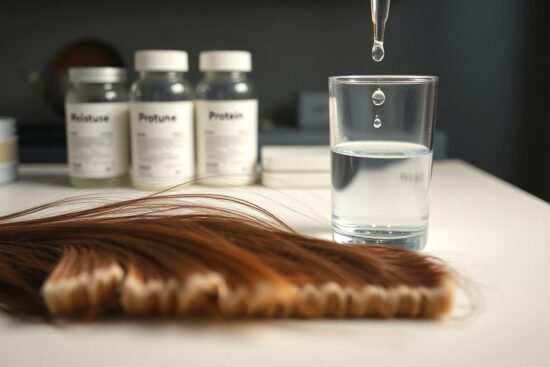
Over the years, I have discovered that finding the right skincare products for Black women can be challenging due to our unique skin types and concerns. To help you navigate this journey, I have compiled a list of dermatologist-recommended items that cater specifically to melanin-rich skin. From moisturizers to treatments, these products address issues such as hyperpigmentation and dryness while promoting a healthy glow. When you invest in the right skincare, you can feel confident in your skin every day.
Key Takeaways:
- Choose products with ingredients that cater to the unique needs of Black skin, such as shea butter, hyaluronic acid, and niacinamide.
- Look for broad-spectrum sunscreens with SPF 30 or higher to protect against UV damage, which can still affect darker skin tones.
- Incorporate gentle exfoliants, like alpha hydroxy acids (AHAs) and beta hydroxy acids (BHAs), to promote cell turnover and maintain an even skin tone.
- Opt for moisturizer formulations that are rich and hydrating to combat dryness, especially for those with textured skin conditions like eczema or psoriasis.
- Pay attention to dermatologist recommendations for acne treatment, as some products may be more effective for Black women without causing hyperpigmentation.
- Utilize nourishing oils, such as jojoba or marula oil, which can provide hydration and balance to the skin without clogging pores.
- Seek out dermatologically tested products that address specific concerns such as hyperpigmentation, sensitivity, or signs of aging.


The Unique Dermatological Needs of Black Women
Black women’s skin exhibits distinct characteristics that can shape their dermatological needs. Increased melanin production often results in a natural glow, yet it can also lead to unique challenges such as hyperpigmentation and keloid formation. Furthermore, skin texture in Black women may vary, requiring tailored formulations that cater to oiliness or dryness. Understanding these nuances is necessary for selecting effective skincare products that promote healthy skin while addressing specific concerns.
Common Skin Concerns and Challenges
Hyperpigmentation stands out as a prevalent issue for many Black women, often triggered by acne or sun exposure. In addition, *dryness* and *sensitivity* can lead to challenges, as can the tendency for keloid scars, which makes post-inflammatory marks a significant concern. These conditions necessitate targeted approaches to skincare that effectively address and prevent exacerbation of these issues.
The Importance of Targeted Ingredients
Choosing *targeted ingredients* can fundamentally transform the skincare routine for Black women. Ingredients like *kojic acid*, *glycolic acid*, and *azelaic acid* specifically tackle hyperpigmentation, while *hyaluronic acid* provides moisture without clogging pores. Botanical extracts such as *niacinamide* offer additional benefits like inflammation reduction and enhancing skin barrier function, ideal for combatting dryness and sensitivity. By selecting products with these well-researched components, you can significantly improve skin health and appearance.
Integrating targeted ingredients into your skincare regimen is not just about addressing common concerns—it’s about starting a journey towards healthier skin. For instance, products containing *kojic acid* can help fade dark spots effectively over time, while *niacinamide* boosts the skin’s resilience against environmental aggressors. The right combination of active ingredients not only works synergistically to elevate your skincare routine but also attunes to the intricacies of Black skin, resulting in a more radiant and even complexion.
Must-Have Moisturizers for Melanin-Rich Skin
For melanin-rich skin, effective moisturizers serve as the backbone of a healthy skincare routine. I’ve seen how well-formulated products help combat dryness and maintain a balanced complexion. Opting for rich creams or lotions that provide long-lasting hydration is key. Ingredients like shea butter, cocoa butter, and glycerin are particularly beneficial, ensuring your skin feels supple and radiant throughout the day.
Key Ingredients for Hydration and Nourishment
In search of effective moisturizers, I’ve discovered several key ingredients that stand out. Hyaluronic acid draws moisture into the skin, while ceramides fortify the skin barrier, preventing water loss. Natural oils, such as jojoba and almond oil, not only hydrate but also replenish important fatty acids, promoting a youthful glow.
Highly Recommended Products
Out of the myriad of products I’ve tried, a few moisturizers consistently rise to the top for their ability to cater to the unique needs of melanin-rich skin. The CeraVe Moisturizing Cream is a favorite of mine, rich in ceramides and hyaluronic acid. Another standout is the The Ordinary Natural Moisturizing Factors + HA, a budget-friendly option packed with hydrating ingredients. For a luxurious treat, I turn to SheaMoisture’s 100% Virgin Coconut Oil Daily Hydration Leave-In Treatment for its amazing nourishing properties.
These recommended products have shown remarkable results for many, including enhancing moisture retention and improving overall skin texture. When I incorporate these moisturizers into my routine, I notice decreased dryness and a healthier, more even complexion. Understanding your skin’s unique needs will guide you in selecting the best options for your skincare journey.
Sun Protection: Beyond the Basics
Incorporating sun protection into your skincare routine goes beyond slapping on sunscreen before heading out the door. Understanding the specific needs of your skin is key in selecting the right SPF and application method. Black women can often underestimate the effects of UV rays, but *photoaging* and skin damage can affect us just like anyone else. That’s why layering sun protection — incorporating protective clothing, wide-brimmed hats, and seeking shade during peak sun hours — can significantly enhance your skin’s health.
The Significance of Sunscreen for Darker Skin Tones
Many believe that darker skin tones don’t require sunscreen, but that’s a misconception I aim to dispel. While melanin does provide some natural protection against UV rays, it isn’t enough to completely shield you from skin cancer and hyperpigmentation. Irregularities in skin tone can also worsen with sun exposure, making daily SPF application important for maintaining an even complexion.
Top Dermatologist-Approved Formulations
For effective sun protection tailored to darker skin tones, dermatologists often recommend products that are both hydrating and non-greasy. Formulations that include *broad-spectrum* protection from UVA and UVB rays are ideal. Look for sunscreens with at least SPF 30, mineral options like zinc oxide for sensitive skin, or tinted moisturizers that provide a natural glow while protecting against UV damage. A few standout products include Black Girl Sunscreen, Neutrogena Ultra Sheer Dry-Touch SPF 100, and the EltaMD UV Clear Broad-Spectrum SPF 46. Each offers lightweight coverage that won’t leave a white cast.
Black Girl Sunscreen has gained popularity for its broad-spectrum protection while being free of harmful chemicals, perfectly catering to the needs of melanin-rich skin. Neutrogena Ultra Sheer provides high SPF in a matte finish, making it a great choice for those with oily skin. Lastly, EltaMD UV Clear not only protects but also contains niacinamide, which can soothe and reduce redness. Incorporating these dermatologist-approved products into your daily skincare routine will significantly improve your skin’s resilience against sun damage.
Exfoliation Essentials: Finding the Right Balance
Striking the right balance in exfoliation can transform your skin, especially for Black women who may experience buildup and uneven texture. You want to ensure that your routine leaves your skin smooth and radiant without causing irritation or compromising your moisture barrier. It’s all about tailoring your approach to fit your skin’s unique needs.
Types of Exfoliators and Their Benefits
Exfoliators come in various forms, and each offers distinct advantages. Here’s a quick breakdown:
| Type | Benefits |
| Physical Exfoliators | Enhance skin texture and remove dead cells. |
| Chemical Exfoliators | Provide deeper penetration and promote cell turnover. |
| Enzymatic Exfoliators | Use natural enzymes to gently dissolve dead skin. |
| Microdermabrasion | Boosts collagen production for a youthful appearance. |
| Peel-off Masks | Deliver concentrated benefits in a quick treatment. |
Any of these exfoliating methods can dramatically improve your skin’s texture, but understanding which works best for you is crucial to maintaining a healthy complexion.
Recommended Products and Usage Tips
Incorporating quality exfoliation products into your routine can elevate your skincare regimen. Here are products I recommend:
- Gentle Scrub: Use 1-2 times a week for physical exfoliation.
- AHAs or BHAs: Apply 2-3 times a week to promote cell turnover.
- Enzymatic Exfoliants: Utilize these for sensitive or reactive skin types.
- Hydrating Masks: Make this a pampering ritual every week.
- AHA Peel Pads: Great for on-the-go exfoliation; use as directed.
This structured approach can brighten your complexion and reduce the appearance of dark spots, ultimately leading to smoother, healthier skin.
Using products based on these categories paired with careful application can maximize their benefits while minimizing irritation. A good routine involves a gentle scrub bi-weekly coupled with an AHA/BHA treatment. Ensuring that you follow up with a robust moisturizer will keep your skin hydrated and plump.
- Select Exfoliating Products Wisely: Start with sensitive options if you’re unsure.
- Test New Products: Always do a patch test to avoid reactions.
- Hydrate Post-Exfoliation: Addresses any potential dryness.
- Consult a Dermatologist: Ideal for personalized advice tailored to your skin type.
- Observe Your Skin’s Response: Tweak routine based on how your skin reacts.
This holistic and considered approach will empower you to achieve the glowing skin you desire while avoiding possible pitfalls of over-exfoliating or using irritating products. I truly believe that finding the right balance in exfoliation will leave you feeling confident in your skin.
Tailoring Your Routine: Creating a Personalized Skincare Strategy
Personalizing your skincare routine ensures your unique needs are met, especially for Black women whose skin can exhibit a variety of characteristics and concerns. By analyzing various factors such as *skin type*, *environment*, and *specific skin concerns* like hyperpigmentation, I can help you create a regimen that works for you. Focusing on suitable products and their application frequency will not only enhance your skin’s appearance but also maintain its health long-term.
Identifying Your Skin Type and Its Needs
Understanding your skin type is the first step in crafting an effective skincare plan. Whether your skin is oily, dry, combination, or sensitive, your choice of products should cater to its specific needs. Oily skin may benefit from lightweight gels, while dry skin often requires creamier formulations. Assessing factors such as how your skin feels throughout the day can guide your product selection.
Daily vs. Weekly Regimen Recommendations
To maximize the health and appearance of your skin, you’ll want to distinguish between daily and weekly regimen needs. Daily routines typically include cleansing, moisturizing, and sun protection, while treatments like masks and deep exfoliation should be saved for once or twice a week. This approach prevents over-exfoliation and irritation, allowing your skin to thrive.
Daily regimens are foundational, focusing on maintaining hydration and protection to combat daily environmental stressors. I recommend cleansing twice a day and moisturizing with a product containing hyaluronic acid for hydration. On the other hand, weekly regimens, which can include clay masks for deeper cleansing and targeted treatments for issues like dark spots or acne, enhance your skin’s resilience and health. Listening to your skin’s reactions will ensure you achieve the best results from both your daily and weekly routines.
To wrap up
Drawing together the insights on dermatologist-recommended skincare products for Black women, I emphasize the importance of tailored solutions that address specific skin concerns such as hyperpigmentation and hydration. You should consider incorporating products with proven ingredients like hyaluronic acid and niacinamide into your routine. By choosing formulas that prioritize your unique skin needs, you can enhance your natural beauty and confidence. In my experience, investing in the right skincare can lead to significant improvements, so take the time to find what works best for your skin.
FAQ
Q: What types of skincare products are recommended for Black women?
A: Recommended skincare products for Black women typically include gentle cleansers, hydrating moisturizers, broad-spectrum sunscreens, and serums with ingredients like vitamin C, hyaluronic acid, and shea butter. It’s important to choose products that cater to specific skin concerns, such as hyperpigmentation or dryness.
Q: Why is sunscreen important for Black women?
A: While many people believe that darker skin is less susceptible to sun damage, UV rays can still cause skin issues such as hyperpigmentation and skin cancer. A broad-spectrum sunscreen with an SPF of 30 or higher is important for protecting the skin from harmful UV rays, which can lead to uneven skin tone and premature aging.
Q: How do I choose a moisturizer suitable for my skin type?
A: When selecting a moisturizer, consider your skin type: oily, dry, or combination. If you have oily skin, look for lightweight, oil-free formulas. For dry skin, opt for thicker creams containing occlusive agents like shea butter or glycerin. Combination skin may benefit from a gel-cream that balances hydration without clogging pores.
Q: Are there specific ingredients to look for in products for hyperpigmentation?
A: Yes, ingredients like vitamin C, niacinamide, and alpha arbutin are effective in treating hyperpigmentation. These ingredients help to brighten the skin and reduce the appearance of dark spots. Additionally, products containing retinoids can aid in cellular turnover, enhancing overall skin tone and texture.
Q: How often should I exfoliate my skin?
A: Exfoliation frequency can vary by skin type. Generally, it’s recommended to exfoliate 1-3 times a week. For sensitive or dry skin, stick to once a week with a gentle exfoliant. For oily skin, you may exfoliate more frequently, but always pay attention to how your skin reacts to avoid irritation.
Q: What are some affordable dermatologist-recommended brands for Black women’s skincare?
A: Some affordable brands recommended by dermatologists for Black women include CeraVe, The Ordinary, Neutrogena, and La Roche-Posay. These brands offer a variety of products that are effective and suitable for diverse skin concerns while remaining budget-friendly.
Q: How can I develop a skincare routine tailored for my needs?
A: To create a personalized skincare routine, start by identifying your skin type and any specific concerns (e.g., dryness, acne, hyperpigmentation). A basic routine should include a gentle cleanser, a treatment product (like a serum), a moisturizer, and sunscreen. You can adjust the products and their application frequency based on your skin’s response and needs.











